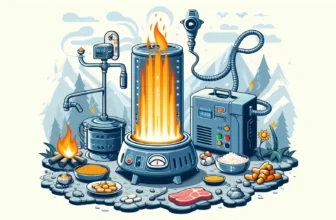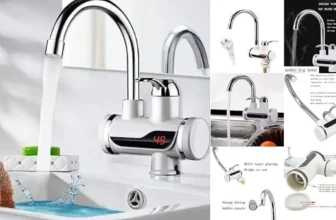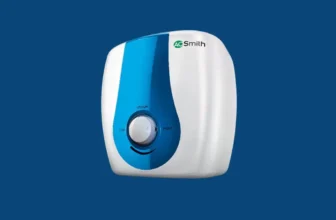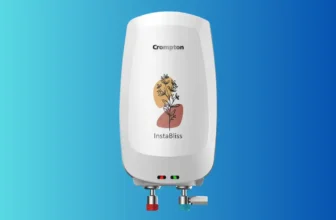Best Kitchen Water Heater: Top Picks for Your Home
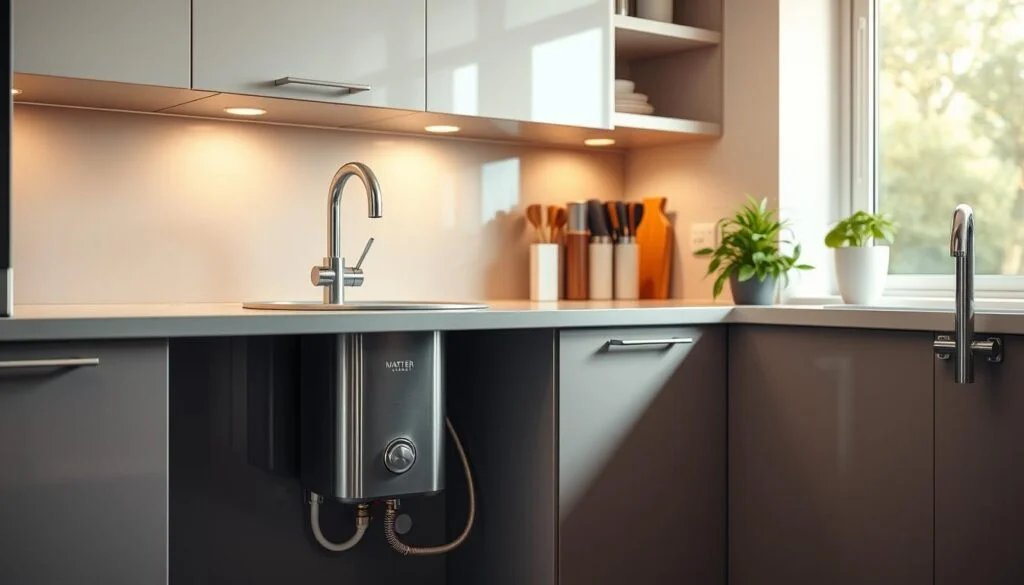
Cooking delicious meals in the kitchen is a true passion of mine. But without a reliable and efficient water heater, the experience can sometimes fall short. As a homeowner, I understand the importance of having a water heater that not only delivers hot water on demand but also does so in an energy-efficient manner, saving me money on my utility bills.
In this article, I’ll guide you through the process of choosing the best kitchen water heater for your home. From understanding the different types of water heating systems to exploring the top brands in the market, I’ll provide you with the information you need to make an informed decision. But first, let me ask you a question that may challenge your preconceptions: Are all kitchen water heaters created equal, or are there some that stand out from the rest?
Key Takeaways
- Discover the various types of kitchen water heaters and their distinct features
- Learn about the benefits of dedicated kitchen water heaters and how they can enhance your cooking experience
- Explore the top brands in the market and their unique offerings
- Understand the differences between tankless and traditional water heaters to make the right choice for your kitchen
- Discover energy-efficient options that will save you money on your utility bills
Understanding Kitchen Water Heaters: A Comprehensive Guide
Choosing the right water heater for your kitchen is key. You have options like tankless, gas, and electric water heaters. Each has its own benefits for your needs.
Types of Water Heating Systems
Kitchen water heaters fall into two main types: tankless and traditional. Tankless heaters give you hot water on demand. Traditional heaters keep a tank of hot water ready.
Benefits of Dedicated Kitchen Water Heaters
A dedicated kitchen water heater has many perks. It ensures hot water is always available for dishes, cooking, and cleaning. It’s also more energy-efficient, tailored for kitchen use.
Key Features to Consider
When picking a kitchen water heater, look at energy efficiency, capacity, and installation needs. Smart controls and Energy Star ratings are also important. They help save money and protect the environment.
| Feature | Importance |
|---|---|
| Energy Efficiency | Reduces energy consumption and utility bills |
| Capacity | Ensures adequate hot water supply for kitchen needs |
| Installation Requirements | Determines ease of integration and potential renovations |
| Smart Temperature Control | Enhances convenience and energy savings |
| Energy Star Rating | Identifies the most efficient and eco-friendly models |
Knowing about kitchen water heaters and their features helps you choose wisely. This ensures you get a reliable and energy-saving hot water solution for your kitchen.
Top Kitchen Water Heater Brands in the Market
Looking for a new water heater for your kitchen? You’ll find many brands to choose from. From big names to local favorites, picking one can be tough. Let’s explore some of the best kitchen water heater brands out there.
AO Smith is a top name in water heaters. They focus on innovation and saving energy. Their kitchen water heaters have cool features like self-cleaning and smart temperature control. This means they work well and last a long time.
Bajaj is another brand to think about. They’re known for being reliable and offering good value. Their kitchen water heaters have special heating parts and easy-to-use designs. This makes them a great choice for many homeowners.
| Brand | Product Range | Customer Ratings | Warranty |
|---|---|---|---|
| AO Smith | Diverse range of kitchen water heaters | 4.8/5 (based on 2,500+ reviews) | 7-10 years |
| Bajaj | Specialized kitchen water heater models | 4.6/5 (based on 1,800+ reviews) | 5-7 years |
| Havells | Wide range of water heaters for kitchens | 4.7/5 (based on 2,200+ reviews) | 7-10 years |
Havells is also worth considering. They’re all about quality and safety. Their kitchen water heaters have cool features like smart temperature control and strong build. They promise reliable service for a long time.
When choosing a water heater, think about what matters to you. Look at features, energy use, what others say, and the warranty. This will help you pick the best one for your kitchen and budget.
Tankless vs. Traditional: Making the Right Choice
Choosing the right water heater for your kitchen is important. You have to decide between a tankless and a traditional model. Knowing the differences helps you pick the best one for your energy needs and budget.
Energy Efficiency Comparison
Tankless water heaters are very energy-efficient. They heat water only when you need it, saving energy. Energy-efficient water heaters with tanks keep water hot all the time but use more energy.
Installation Requirements
Installing a tankless water heater is more complicated than a traditional one. You need extra work for venting, gas lines, and electricity. But, the long-term energy savings make it worth it.
Cost Analysis
Tankless water heaters cost more upfront but save money on bills over time. Traditional heaters might be cheaper to buy but cost more to run.
Choosing between a tankless and traditional water heater depends on your needs and budget. Think about your energy goals and what’s best for your home.
“Investing in an energy-efficient water heater can not only save you money on utility bills but also contribute to a more sustainable future.”
Size and Capacity: Finding the Perfect Fit
Choosing the right kitchen water heater is all about size and capacity. It’s important to think about your household’s water use and your kitchen’s space. This ensures you pick the perfect fit.
To find the right size for your hot water tank or water heater, consider a few things:
- The number of people in your household: A bigger family needs a bigger water heater.
- The average daily hot water usage: Think about showers, laundry, and dishes to estimate your needs.
- The available space in your kitchen: Make sure the water heater fits without messing up your kitchen’s layout.
After you’ve gathered this info, use online tools or talk to a plumber to find the right size. This is key to getting hot water that works well for your family.
| Household Size | Recommended Water Heater Capacity (Gallons) |
|---|---|
| 1-2 people | 30-40 gallons |
| 3-4 people | 40-50 gallons |
| 5-6 people | 50-80 gallons |
Choosing the right size and capacity for your kitchen water heater is crucial. It ensures you get reliable and efficient hot water. By considering your household’s needs and your kitchen’s space, you can find the perfect fit.

Energy-Efficient Options for Modern Kitchens
Today, we’re all about saving the planet. That’s why energy-efficient water heaters are a top pick for kitchens. You can find gas, electric, or even solar models. They help cut down on energy use and save you money.
Solar-Compatible Models
Solar water heaters are a big deal now. They use the sun’s power to heat water. This makes them eco-friendly and can save you money in the long run.
Smart Temperature Control Systems
Smart water heaters are another big leap. They let you control the water temperature exactly. This means you use less energy. Plus, you can adjust it from anywhere, making life easier.
Energy Star Ratings Explained
When picking a water heater, look for the Energy Star rating. It shows the heater is energy-smart. This rating helps you choose a heater that saves money and is good for the planet.
| Feature | Energy-Efficient Water Heater | Traditional Water Heater |
|---|---|---|
| Energy Consumption | Significantly lower | Higher |
| Utility Costs | Reduced monthly bills | Higher monthly bills |
| Environmental Impact | Minimal carbon footprint | Higher carbon footprint |
| Energy Star Rating | Meets or exceeds standards | May not meet standards |
Choosing energy-efficient water heaters is smart. They save you money and help the planet. Whether it’s solar, smart, or Energy Star, you’re making a green choice for your home.
Installation Guide: What You Need to Know
Installing a water heater in your kitchen is key. It’s important to do it right to ensure safety and efficiency. Here’s what you need to know to get started.
Tools and Supplies Needed
- Adjustable wrench
- Pliers
- Screwdriver set
- Tape measure
- Level
- Teflon tape
- Pipe cutter (for copper pipes)
- Pipe wrench (for metal pipes)
Make sure you have all the tools and supplies ready before starting. This will help you work faster and avoid any delays.
Step-by-Step Installation
- First, turn off the power to the old water heater and shut off the water supply.
- Drain the old water heater and disconnect the electrical or gas connections.
- Remove the old water heater and clear the area for the new one.
- Measure the space to make sure the new water heater fits.
- Connect the water supply lines, making sure they’re tight to avoid leaks.
- Attach the pressure relief valve and discharge pipe as per local codes.
- Reconnect the electrical or gas supply, being careful with safety.
- Fill the new water heater and check for leaks.
- Turn on the power or gas and let the water heat up.
- Adjust the temperature to your liking.
If you’re not sure about installing a kitchen water heater, it’s best to call a licensed plumber. They can make sure it’s done right and meets all codes.

By following these steps and being careful, you can install your new kitchen water heater successfully. If you’re unsure about anything, don’t hesitate to get professional help for a safe and smooth installation.
Maintenance Tips for Longer Heater Life
Keeping your kitchen water heater in good shape is key to its long life and efficiency. Regular care not only makes your appliance last longer but also saves you from expensive repairs later. We’ll cover a detailed maintenance checklist, common problems, and when to get a pro’s help.
Regular Maintenance Checklist
To keep your water heater running well, follow these easy steps:
- Drain the tank yearly to clear out sediment.
- Check the anode rod and replace it every 2-3 years to stop corrosion.
- Test the temperature and pressure (T&P) relief valve to make sure it’s working right.
- Look at the thermostat and heating elements for wear or damage.
- Clean the tank’s outside and the area around it to keep air flowing well.
Common Problems and Solutions
Water heaters can have problems even with regular care. Here are some common issues and how to fix them:
- Leaks: Look for water leaks in the tank, fittings, and connections. Fix them quickly to avoid water damage.
- Reduced hot water supply: This might mean your thermostat or heating element isn’t working right. Check the manual for how to fix or replace them.
- Discolored or foul-smelling water: This could mean you need to flush the tank or replace the anode rod.
When to Call a Professional
While you can do some water heater maintenance yourself, it’s smart to get a pro for tricky issues or if you’re not sure what to do. A skilled water heater repair technician can find the problem, give expert advice, and make sure your water heater works safely and right.
Budget-Friendly Options Without Compromising Quality
As a homeowner, finding a kitchen water heater that’s affordable is key. I’ll show you some options from trusted brands that are both budget-friendly and high-quality.
The GE 40-Gallon Electric Water Heater is a great choice. It’s small, perfect for smaller kitchens. It’s also very energy-efficient, saving you money on bills. It’s easy to use and clean, making it a smart choice for your kitchen.
The Rheem Performance Plus 50-Gallon Gas Water Heater is another good option. It’s affordable and powerful, thanks to its gas burner and strong build. It’s also eco-friendly and has smart controls for easy temperature adjustment.
FAQ
What are the different types of kitchen water heaters available?
There are two main types: tankless and traditional storage tank models. Tankless heaters give hot water right away. Storage tanks store water and reheat it as needed.
What are the key features I should consider when choosing a kitchen water heater?
Look at capacity, energy efficiency, and recovery rate. Also, consider temperature control and installation needs. Brand reputation, warranty, and customer reviews are important too.
How do I determine the right size and capacity for my kitchen water heater?
The right size depends on your kitchen’s hot water needs. Think about your household size, how often you use hot water, and if you need it at the same time. A pro can help figure out the best size for you.
What are the benefits of a dedicated kitchen water heater?
A dedicated water heater offers faster hot water, better control, and handles peak use without affecting other areas. It’s a big plus for kitchens.
How can I ensure my kitchen water heater is energy-efficient?
Choose models with high Energy Star ratings for top energy efficiency. Tankless, solar, and smart-controlled heaters also save energy.
What is the typical lifespan of a kitchen water heater, and how can I extend it?
Kitchen water heaters last 8 to 12 years with care. Regular maintenance, like flushing and anode rod replacement, helps. Follow the maker’s maintenance guide to keep it running longer.
When should I consider replacing my kitchen water heater?
Replace it if it’s over 10 years old, breaks down often, or can’t meet hot water needs. Also, if there are leaks or corrosion, it’s time for a new one. Replacing it before it fails prevents water damage.
How difficult is the installation process for a new kitchen water heater?
Installation difficulty varies by type and your plumbing. Tankless models need more work, while traditional ones are simpler. Always hire a licensed plumber for safe and correct installation.
Read More:-
Best Water Heater for Bathroom: Complete Buying Guide
Top Rated Instant Water Heater Reviews & Guide 2024
Bajaj Water Heater: Top-rated models, reviews, and buying guide for your home


